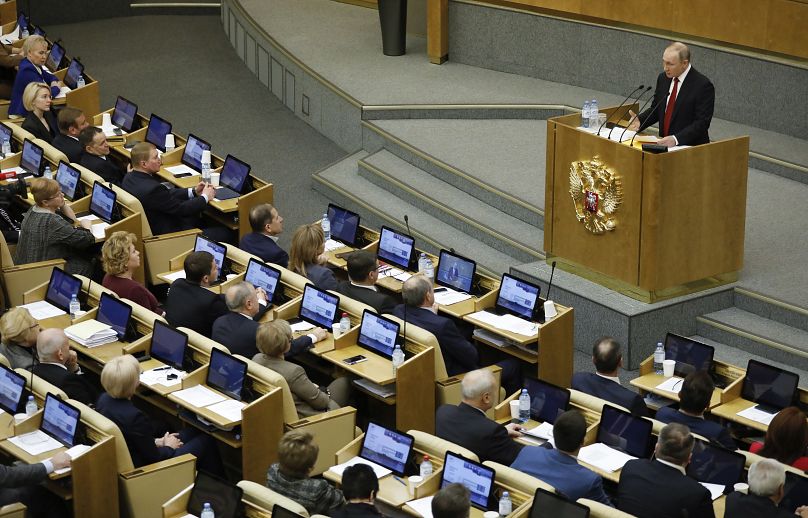The law still needs to be approved by the country's Constitutional Court and in a referendum set for April 22.
Vladimir Putin has signed a law for constitutional changes on Saturday, that would allow him to seek reelection in 2024.
 ADVERTISEMENT
ADVERTISEMENT
 ADVERTISEMENT
ADVERTISEMENT
The signed measure still needs approval by the country's Constitutional Court and a nationwide vote, set for April 22.
He had supported the proposed constitutional amendment on Tuesday. It sailed through the Russian's parliament with only one countervote.
The constitutional change would see the suspension of a law that limits Russian presidents to two consecutive terms.
It would pave the way for the 67-year-old — who first became president in 2000 — to stay in office until 2036.
Russian MP Valentina Tereshkova had proposed either scrapping Russia's two-term limit for presidents or stopping the clock so the law wouldn't apply to Putin's time in office.
Putin and the lower house of parliament quickly endorsed the proposal put forward by 83-year-old former Soviet cosmonaut Tereshkova
Kremlin critics denounced the move as cynical manipulation and called for protests.
MPs also passed a set of constitutional amendments proposed by Putin that include defining marriage as a heterosexual union and language pledging homage to “ancestors who bequeathed to us their ideals and a belief in God".
Constitutional amendments
In a speech at the parliament, Putin opposed doing away with the presidential term limit but backed stopping the count and restarting it in 2024, if the constitution is revised. Putin second consecutive six-year term ends in 2024.
A nationwide vote on the amendments is scheduled for next month.
Putin has been in power for more than 20 years, and he is Russia's longest-serving leader since Soviet dictator Josef Stalin. After serving two presidential terms in 2000-2008, he shifted to the Russian prime minister's office while protege Dmitry Medvedev served as a placeholder president.
After the length of a presidential term was extended to six years under Medvedev, Putin reclaimed the presidency in 2012 and won another term in 2018.
Observers had speculated that to retain the presidency, Putin could use constitutional amendments he unveiled in January to scrap term limits; move into the prime minister's seat with strengthened powers; or continue calling the shots as the head of the State Council.
However, Putin had dismissed those suggestions, and it wasn't clear until Tuesday what option he might use to keep power. The Russian leader finally revealed his cards after Tereshkova, a legendary figure glorified for her pioneering 1963 space flight, offered her ideas.
“I propose to either lift the presidential term limit or add a clause that after the revised constitution enters force, the incumbent president, just like any other citizen, has the right to seek the presidency,” she said to raucous applause in the State Duma.
After Tereshkova unveiled her proposal in an apparently choreographed move, Putin quickly arrived in parliament to address lawmakers.
He said he was aware of public calls for him to stay on as president and emphasised that Russia needs stability above all.
“The president is a guarantor of security of our state, its internal stability and evolutionary development,” Putin said. “We have had enough revolutions.”
However, he said that since the constitution is a long-term document, scrapping the term limit wasn't a good idea.
“In the long-term perspective, the society must have guarantees of regular government rotation,” he said. “We need to think about future generations."
And only then did Putin drop the bombshell, saying he positively viewed Tereshkova's alternate proposal to restart the term count when the revamped constitution enters into force.
“As for the proposal to lift restrictions for any person, any citizen, including the incumbent president, to allow running in future elections ... this option is possible,” Putin said.
He added that the Constitutional Court would need to judge if the move would be legal, although the court's assent is all but guaranteed.
At the same time, Putin quashed speculation that the Kremlin might call an early parliamentary election for the fall, saying he considered it unnecessary. Moments later, the Duma's speaker could be heard directing his deputy to ask the lawmaker who proposed holding the early vote to withdraw his motion,
Putin's statement came as lawmakers were considering the amendments in a crucial second reading when changes in the document are made.
The Kremlin-controlled lower house, the State Duma, quickly endorsed the proposed amendments by a 382-0 vote with 44 abstentions. A vote on a third reading will be a quick formality. A nationwide vote on the proposed amendments is set for April 22.
Russia's leading opposition figure, Alexei Navalny, mocked the proposed change.
"Putin has been in power for 20 years, and yet he is going to run for the first time,” Navalny tweeted.
A group of opposition activists called for a protest rally in Moscow on March 21, saying in a statement, “The country where the government doesn't change for 20 years has no future," they said in a statement.
Putin's approval ratings have remained high despite a recent drop amid Russia's economic troubles and stagnant living standards. It's unclear if the fragmented and disorganised Russian opposition can mount a serious challenge to the Kremlin.
The ruble's sharp drop this week, caused by a steep fall in global oil prices in the wake of the collapse of OPEC's agreement with Russia to control crude output, could herald deeper economic problems and hurt Putin's popularity.
“It looks like this crisis situation has made Putin drop his mask and do something he had originally planned, and to do it quickly," Abbas Gallyamov, an independent political analyst said.
In a speech to lawmakers, Putin vowed that the new coronavirus and plummeting oil prices would not destabilize Russia.
“Our economy will keep getting stronger and the key industries will become more powerful and competitive,” he said.











